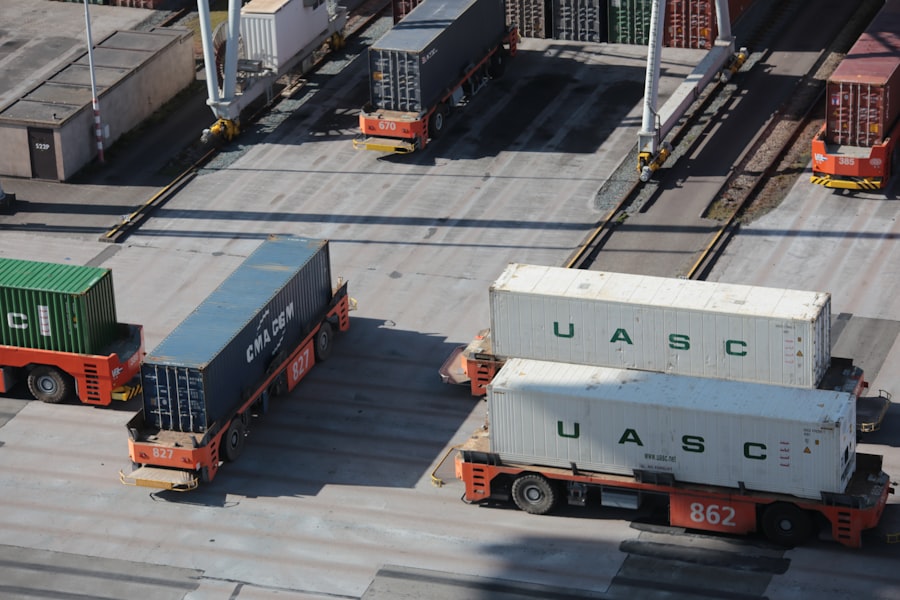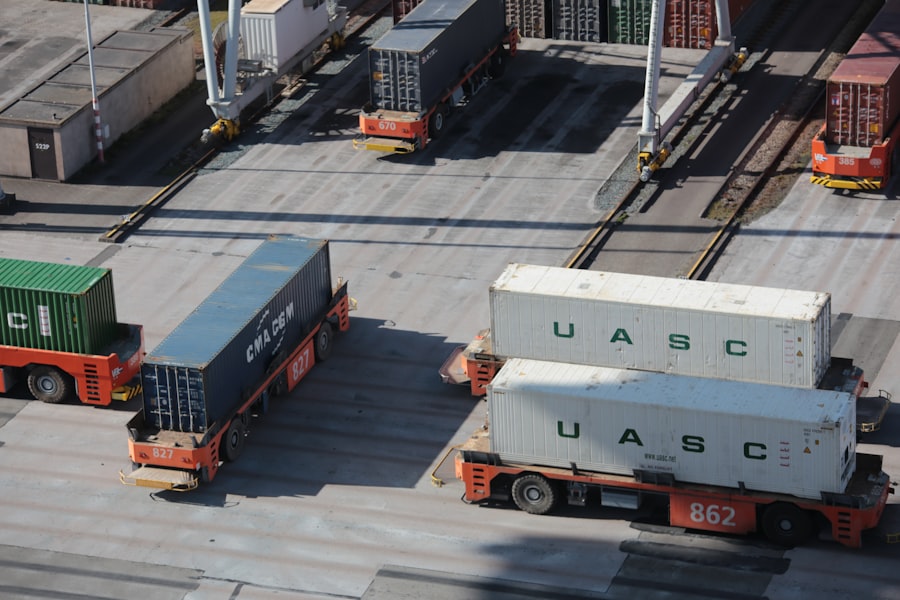Global logistics is a complex web of processes that involves the planning, implementation, and control of the flow of goods and services across international borders. As businesses expand their reach into global markets, the intricacies of logistics become increasingly pronounced. However, this expansion is not without its pitfalls.
Global logistics failures can occur due to a myriad of factors, including mismanagement, unforeseen events, and technological shortcomings. These failures can lead to significant disruptions in supply chains, affecting not only the companies involved but also their customers and the broader economy. The ramifications of logistics failures extend beyond immediate financial losses.
They can tarnish a company’s reputation, erode customer trust, and lead to long-term operational challenges.
This article delves into the multifaceted nature of global logistics failures, exploring their impact on businesses, the challenges faced, and potential strategies for mitigation.
Key Takeaways
- Global logistics failures can have a significant impact on businesses, leading to supply chain disruptions and financial losses.
- Common challenges in global logistics include transportation delays, inventory management issues, and communication barriers.
- Technology plays a crucial role in addressing global logistics failures, with advancements in tracking, automation, and data analytics.
- Effective communication is essential in global logistics to ensure smooth coordination among various stakeholders and minimize errors.
- Environmental and regulatory challenges, along with supply chain disruptions, further contribute to global logistics failures, requiring proactive strategies for mitigation.
The Impact of Global Logistics Failures on Businesses
The consequences of global logistics failures can be profound and far-reaching.
For instance, if a retailer cannot restock its shelves due to shipping delays, it risks losing customers to competitors who can meet demand more effectively.
This loss of revenue can be particularly damaging in industries where consumer loyalty is hard-won and easily lost. Moreover, the financial implications of logistics failures can extend beyond immediate sales losses. Companies may incur additional costs related to expedited shipping, inventory management, and even legal liabilities if they fail to meet contractual obligations.
The cumulative effect of these costs can strain a company’s resources and hinder its ability to invest in growth opportunities. In an era where customer expectations are higher than ever, businesses must recognize that logistics is not merely a back-end function but a critical component of their overall strategy.
Common Challenges in Global Logistics

Navigating the complexities of global logistics presents numerous challenges that can lead to failures if not managed effectively. One of the most significant hurdles is the variability in regulations across different countries. Each nation has its own set of customs laws, tariffs, and import/export restrictions, which can complicate the movement of goods.
Companies must stay informed about these regulations to avoid costly delays and penalties. Additionally, logistical challenges are often exacerbated by geopolitical factors such as trade wars, political instability, and economic sanctions. These elements can create uncertainty in supply chains, making it difficult for businesses to plan effectively.
Furthermore, natural disasters and pandemics can disrupt transportation networks and manufacturing capabilities, leading to unforeseen delays and shortages. As such, companies must develop robust risk management strategies to navigate these challenges and ensure continuity in their operations.
The Role of Technology in Global Logistics Failures
| Technology | Global Logistics Failures |
|---|---|
| Real-time tracking | Reduced shipment delays |
| Inventory management systems | Improved stock accuracy |
| Supply chain visibility tools | Enhanced transparency |
| Transportation management software | Optimized route planning |
Technology plays a dual role in global logistics; while it has the potential to enhance efficiency and transparency, it can also contribute to failures if not implemented correctly. Advanced technologies such as artificial intelligence (AI), blockchain, and the Internet of Things (IoT) have revolutionized logistics by enabling real-time tracking, predictive analytics, and improved inventory management. However, reliance on technology also introduces vulnerabilities.
Cybersecurity threats pose significant risks to logistics operations, as breaches can lead to data loss and operational disruptions. Moreover, the integration of new technologies requires substantial investment and training. Companies that rush into adopting cutting-edge solutions without proper planning may find themselves facing compatibility issues or operational inefficiencies.
Therefore, while technology can be a powerful ally in overcoming logistics challenges, it must be approached with caution and strategic foresight.
The Importance of Effective Communication in Global Logistics
Effective communication is paramount in global logistics, as it ensures that all stakeholders are aligned and informed throughout the supply chain process. Miscommunication can lead to misunderstandings regarding shipment schedules, inventory levels, and customer expectations. For instance, if a supplier fails to communicate a delay in production, it can result in a cascading effect that disrupts the entire supply chain.
Furthermore, clear communication channels facilitate collaboration among various parties involved in logistics, including suppliers, manufacturers, distributors, and retailers. Establishing strong relationships built on transparency can help mitigate risks associated with logistics failures. Companies that prioritize communication are better equipped to respond swiftly to challenges and adapt their strategies as needed.
Environmental and Regulatory Challenges in Global Logistics

In recent years, environmental concerns have become increasingly prominent in discussions about global logistics. Companies are under pressure to adopt sustainable practices that minimize their carbon footprint and comply with environmental regulations. However, balancing sustainability with efficiency can be challenging.
For example, while air freight is faster, it is also more carbon-intensive than ocean freight. Businesses must carefully consider their transportation choices to align with both regulatory requirements and corporate social responsibility goals. Regulatory challenges also extend beyond environmental considerations.
Compliance with international trade agreements and customs regulations is essential for smooth operations. Failure to adhere to these regulations can result in fines or shipment delays that disrupt supply chains. As governments around the world continue to evolve their regulatory frameworks in response to changing economic conditions and environmental concerns, companies must remain vigilant and adaptable.
Supply Chain Disruptions and Global Logistics Failures
Supply chain disruptions are a common catalyst for global logistics failures. Events such as natural disasters, political unrest, or pandemics can create significant obstacles for businesses trying to maintain smooth operations. The COVID-19 pandemic serves as a stark reminder of how quickly supply chains can be disrupted on a global scale.
Lockdowns and restrictions led to factory closures and transportation halts, causing widespread delays and shortages across various industries. In addition to external disruptions, internal factors such as poor inventory management or inadequate forecasting can also contribute to supply chain failures. Companies that lack visibility into their supply chains may struggle to identify potential risks or respond effectively when disruptions occur.
To mitigate these risks, businesses must invest in robust supply chain management practices that enhance resilience and adaptability.
Strategies for Overcoming Global Logistics Failures
To navigate the complexities of global logistics successfully, companies must adopt proactive strategies aimed at minimizing failures. One effective approach is diversifying suppliers and transportation routes. By not relying on a single source or route for critical components or products, businesses can reduce their vulnerability to disruptions caused by localized events.
Additionally, investing in technology that enhances visibility across the supply chain is crucial. Tools such as real-time tracking systems enable companies to monitor shipments closely and respond quickly to any issues that arise. Furthermore, fostering strong relationships with suppliers and partners can facilitate better communication and collaboration during challenging times.
Case Studies of Global Logistics Failures
Examining real-world examples of global logistics failures provides valuable insights into the complexities involved in managing supply chains. One notable case is that of a major electronics manufacturer that faced significant delays due to a shortage of semiconductor chips during the pandemic. The company had relied heavily on a limited number of suppliers for these critical components.
When production was disrupted at one facility due to COVID-19 outbreaks, it led to widespread delays in product launches and significant financial losses. Another example involves a large retail chain that experienced logistical challenges during peak holiday seasons due to inadequate inventory management systems. The company struggled to keep up with demand as supply chain disruptions led to stockouts in key product categories.
This failure not only impacted sales but also damaged customer loyalty as shoppers turned to competitors who could meet their needs more effectively.
The Future of Global Logistics: Trends and Solutions
As global logistics continues to evolve, several trends are shaping its future landscape. One significant trend is the increasing emphasis on sustainability within supply chains. Companies are exploring eco-friendly transportation options and implementing practices that reduce waste throughout their operations.
This shift not only addresses regulatory pressures but also aligns with consumer preferences for environmentally responsible brands. Additionally, advancements in technology will play a pivotal role in shaping the future of logistics. Automation and robotics are expected to streamline warehouse operations and improve efficiency in transportation networks.
Furthermore, the integration of artificial intelligence will enable predictive analytics that enhances decision-making processes across supply chains.
Addressing Global Logistics Failures for a Sustainable Future
In conclusion, global logistics failures present significant challenges for businesses operating in an interconnected world. The impact of these failures extends beyond immediate financial losses; they can affect customer trust and long-term viability. By understanding the common challenges faced in global logistics—ranging from regulatory hurdles to supply chain disruptions—companies can develop effective strategies for mitigation.
Embracing technology while prioritizing effective communication will be essential for navigating future complexities in logistics. Moreover, addressing environmental concerns through sustainable practices will not only comply with regulations but also resonate with consumers increasingly focused on corporate responsibility. As businesses continue to adapt to an ever-changing landscape, addressing global logistics failures will be crucial for ensuring a sustainable future for all stakeholders involved in the supply chain ecosystem.
In recent years, global logistics failures have become a significant concern for businesses worldwide, impacting supply chains and delivery timelines. A related article that delves into the intricacies of these challenges can be found on MyGeoQuest. This article explores the various factors contributing to logistical disruptions, such as geopolitical tensions, natural disasters, and technological shortcomings. For a deeper understanding of these issues and potential solutions, you can read more about it by visiting this page.
WATCH NOW! Unlocking Disaster: 7 Choke Points That Could Fracture Our Connected World Overnight
FAQs
What are some common global logistics failures?
Some common global logistics failures include delays in transportation, inaccurate inventory management, customs clearance issues, and communication breakdowns between different parties involved in the supply chain.
What are the consequences of global logistics failures?
Global logistics failures can lead to increased costs, delayed delivery times, damaged reputation, and loss of customer trust. It can also result in disruptions to the entire supply chain and impact the overall business operations.
How can global logistics failures be prevented?
Global logistics failures can be prevented by implementing efficient supply chain management practices, utilizing advanced technology for tracking and monitoring shipments, maintaining clear communication with all parties involved, and conducting regular risk assessments to identify potential issues.
What role does technology play in preventing global logistics failures?
Technology plays a crucial role in preventing global logistics failures by providing real-time visibility into the supply chain, enabling better inventory management, automating processes, and facilitating communication and collaboration between different stakeholders.
What are some examples of global logistics failures in recent years?
Some examples of global logistics failures in recent years include the disruption caused by the COVID-19 pandemic, the Ever Given container ship blocking the Suez Canal, and the cyberattack on the Colonial Pipeline, which led to fuel shortages in the United States.
